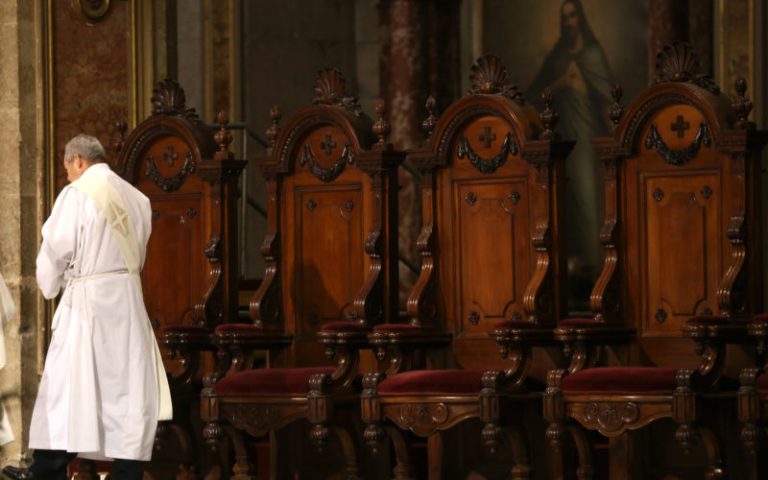Patrick J. Buchanan: Behind Trump’s Exasperation
June 12, 2018Seeing Our Lady’s “Mama Bear” Moments
June 12, 2018
Photo: A priest is pictured during Mass at the Metropolitan Cathedral in Santiago de Chile (Getty Images)
How could Bishop Barros stay in office when it was clear he was such a liability?
By Fr Alexander Lucie-Smith, Catholic Herald, Tuesday, 12 Jun 2018
The Pope has accepted the resignation of Monsignor Barros, the bishop of Osorno, Chile. Mgr Barros, as attentive readers of this magazine will know, has been contested ever since his appointment to the see, which took place in March 2015, when a fight broke out in the Cathedral during his installation Mass. Barros leaves behind a bitter legacy of division in the diocese of Osorno and in the Chilean Church in general.
There are important lessons to be learned here.
First of all, when a man is contested in the way Barros was, by clergy (including bishops) and laity, his appointment surely becomes unthinkable, simply because a diocesan bishop is supposed to be the focus of unity in his diocese. If he cannot be that, he surely cannot be a bishop. So, why was the Barros appointment forced through in the first place?
We know that the Church has an elaborate procedure for appointing bishops. And we also know that this procedure is sometimes short-circuited. No one can be certain, but there are indications that the appointment of Bishop Barros was pushed through by friends in high places, circumventing the usual processes. If this was the case, then this was an abuse; and the way the story has ended is a sure sign of the damage such an administrative abuse can create.
The other things is this: when something is seen not to be working, the best thing to do is to reverse the decision as soon as possible. When in a hole, stop digging. It was clear from day one that Barros was a disaster, yet the institutional Church doubled down on the appointment, and the Pope himself made several personal interventions on behalf of Barros against his critics. This was not the wisest of moves, and in the end, it made no difference: but the people of Osorno had to suffer the storm for three years. It was rather unfair on them. The Church needs to put the needs of the People of God first in any calculations.
Barros was, one suspects, the tip of the iceberg; behind Barros was the infinitely more important figure of Karadima, the abuser priest of El Bosque, the posh Santiago parish. Too many people had invested heavily in Karadima over the years to be able to cut their ties cleanly with him after his fall. Again, does this continuing protection of Karadima protégés do the People of God or the mission of the Church any good at all?
Finally, what is going to happen to Barros now? After one attempt at recycling which failed, perhaps a lesson has been learned. Let’s hope so. We can all wish him all a very happy and quiet retirement. May he never be heard of again, for the sake of the good of the Church.







